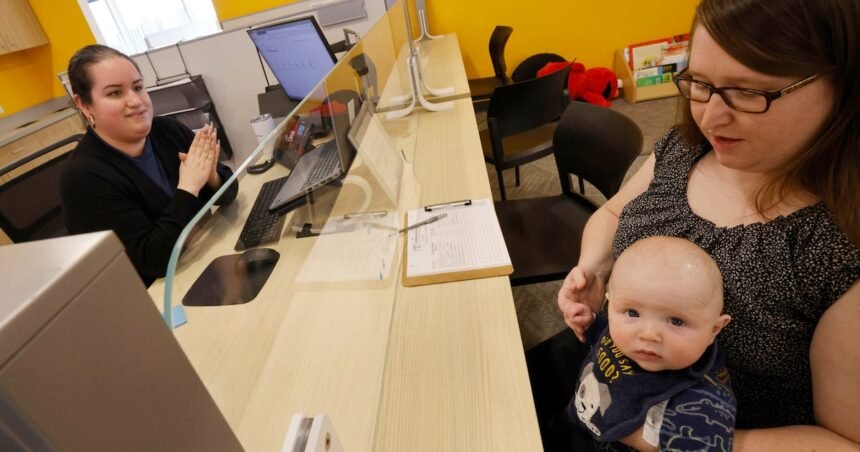Having child care for her daughter while Chantel Gonzalez finished college kept her family off the streets, she said. Now, 11 years later, she helps parents find affordable options because she knows such offerings are limited.
“Child care is very essential for parents to go to work and go to school, so we can progress in life,” said Gonzalez, who works with the nonprofit ChildCareGroup.
One way to expand options is through incentives that prompt businesses to do more to help parenting employees, advocates say. Sen. Royce West, D-Dallas, has proposals before the Legislature that he said are aimed at providing tax relief for the child care industry. One would give franchise tax credits to businesses providing on-site or contracted child care.
While advocates say such an incentive could help, they also worry about unintended consequences with cost pressures being shifted.
Texas loses $11.4 billion annually due to inadequate child care’s effect on productivity and revenue for parents, businesses, and taxpayers, according to The University of Texas at Austin.
“The theme we hear from employers time and time again is: we know we need to do more in terms of child care,” said Kelsey Erickson Streufert, the Texas Restaurant Association’s chief public affairs officer.
Families don’t have access to child care for many reasons, advocates say, namely rising costs and staffing challenges.
“About 550,000 low-income kids don’t have access to child care that they need, so there’s ample opportunity for the child care profession to provide those children services,” West said.
Business leaders say a tax incentive would help offset the cost of helping their employees obtain child care for their children.
Child care providers appreciate tax breaks, but giving them to corporations could unintentionally harm local centers, said Audrey Rowland, founder of Green Space Learning and president of the Texas Association for the Education of Young Children.
If many parents leave community providers for care offered or outsourced by businesses, that could have a ripple effect. Fewer families enrolled in centers could result in higher tuition for those remaining.
“If Tesla or some of these other larger corporations were encouraged to open their own childcare center, how would that impact my business?” Rowland said.
West counters that the demand for affordable child care in Texas is so great that his proposal will have minimal, “if any,” impact on existing child care centers. He expects amendments to his bill that would allow for incentives to businesses partnering with local child care centers for either contracting or operating child care services.
Nearly 600,000 children under six live in the Dallas region, with 65% of their parents employed, according to the U.S. Census Bureau.
North Texas has over 3,580 child care centers that can only serve 322,595 children, offering 96.7 seats per 100 kids, but only 10.7 spots for low-income kids, according to the nonprofit advocacy group Children at Risk.
West and his team have studied how such tax efforts have played out in other states, basing his legislation on public policy recommendations from UT’s Lyndon B. Johnson School of Law.
The National Women’s Law Center reported in 2018 that 93% of companies couldn’t claim the full benefits of the child care tax credits offered in 17 states because they didn’t owe enough in taxes to take the full credit.
Despite such challenges, leaders in several states now are revisiting these strategies in the wake of the pandemic.
Florida enacted a law last year to offer tax relief to businesses opening child care centers or funding child care for their employees. Arkansas, New Mexico, South Carolina, Mississippi, Kansas, Louisiana and Georgia offer income tax or franchise tax relief to corporations that improve access to affordable child care, West spokesman Vince Leibowitz noted.
More than 5,000 child care centers have closed in Texas since the pandemic, West said. The state is still working to recover from that loss.
Meanwhile, many providers struggle with the financial hit of families leaving because of costs.
Some rely on the Texas Workforce Commission’s scholarship program that helps families afford child care. But 90,000 children are on a waitlist for help, advocates told lawmakers last week.
At Journeys Child Development Center in Grand Prairie, parents are leaving the workforce to care for their children themselves while they wait, operator Danyell Smith said. Reduced enrollment creates decreased revenue, but providers still have to pay staff salaries.
“Considering the child care crisis that we’re in right now … even though we’re down in enrollment, I want to still keep my staff, keep them employed and keep them earning a livable wage,” Smith said.
The median wage for the early education workforce in Texas is $11.67 an hour, forcing 43% of these workers to rely on food stamps and other subsidies, according to the University of California, Berkeley.
“Child care has really only survived because early educators have subsidized the industry by accepting low wages,” said Melanie Rubin, director of the North Texas Early Education Alliance, at the recent state Senate hearing.
West has two other child-care related bills aimed at helping. One would give tax relief to child care centers that increase their open seats. Another would limit a local agency’s ability to impose regulations on providers that duplicate state requirements.
West previously spearheaded Proposition 2, which state voters approved in 2023. It allows local entities — such as cities and counties — to reduce or eliminate municipal property taxes for child care centers in the Texas Rising Star Program, which administers state ratings and improvement plans.
Other Texas bills advocates are tracking include proposals from Sen. Judith Zaffirini, D-Laredo, and Rep. Senfronia Thompson, D-Houston, that would enhance reimbursement rates for providers in Texas Rising Star.
In an effort to aid the early education workforce, Sen. Lois Kolkhorst, R-Brenham, has a bill that would prioritize child care for the children of child care workers.
During the Senate finance committee hearing Wednesday, advocates urged lawmakers to increase funding for the Texas Workforce Commission’s child care scholarship program to reduce the waitlist.
Investing in subsidies at sustainable levels will prevent centers from closing and teachers leaving the field as well as help families, they said.
“No single bill or program is a silver bullet,” Kurt Hudson, a Collin County preschool owner, said at the hearing. “However, the silver bullet for making any of those solutions work is funding.”
This reporting is part of the Future of North Texas, a community-funded journalism initiative supported by the Commit Partnership, Communities Foundation of Texas, The Dallas Foundation, the Dallas Mavericks, the Dallas Regional Chamber, Deedie Rose, the McCune-Losinger Family Fund, The Meadows Foundation, the Perot Foundation, the United Way of Metropolitan Dallas and the University of Texas at Dallas. The News retains full editorial control of this coverage.











